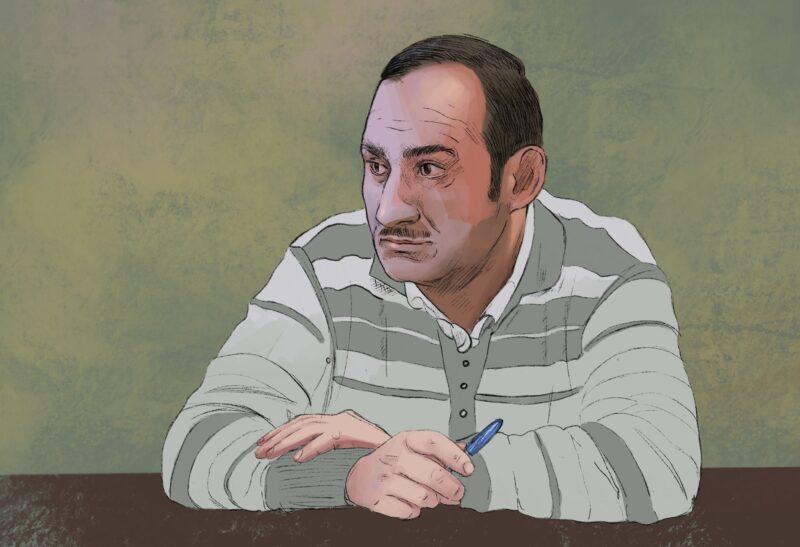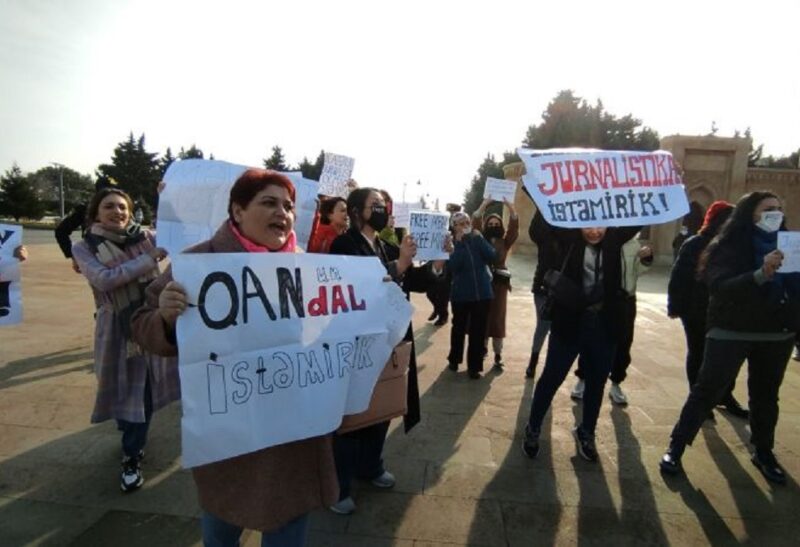

At 10:30 p.m. on April 28 at the Bina airport my and Arif Yunus’s passports and boarding passes were snatched from our hands, and we were led to a small room with a “Security office” sign on the door. Our luggage that we have already checked-in was also brought there. Seven airport employees to carry out a personal inspection and two investigators from the prosecutor’s office – Ibrahim Lambaranski and Sanan Pashayev crammed into this tiny room.
We were not presented with either a written court order that bans leaving the country, or that allows the personal inspection. Mr. Lambaranski verbally stated that we are forbidden to leave the country without any further explanations on the reasons. From 10:30 p.m. until 03:40 a.m. we were kept in that room (without a chance to use restroom) where they carried out the most thorough inspection of all our belongings. Our lawyer was not let in upon his arrival to the airport. Everything, including our underwear was inspected by the airport staff. The protocol on personal inspection and baggage check up wasn’t presented to us. It was signed by the airport staff, as I understood, by witnesses. Nothing infelicitous was found, yet our computer (laptop), camera, video camera, flesh drives with reports for the conference, passports, documents on the property (unauthorized intrusions were made to our apartment on several occasions in our absence, therefore, when we both leave the country, we try to take the most important documents with us in order not to lose or restore them later) were confiscated.
Around 03:40 a.m., we were accompanied to the car, and left the airport together with two athletic looking civilians.
On the way from the airport, these two civilians, whom we have met for the first time, were harassing us. One of the things they were constantly telling us laughing was “when a wife is being raped in front of her husband, he signs of any confessions. When a husband is raped, then…”
We were not told where we were going, only driving up to our house at 125 Narimanov Ave., we realized that we had come home. Here I was truly shocked: six police vans were in our yard. Around forty police officers and young, athletic plainclothes crammed in our porch. We were treated in a very rude manner. Inspector Lambaranski demanded me to open the doors to search the apartment. When I asked for a search warrant, he only chuckled wryly. My husband, Arif Yunus, could no longer bear the stress, specifically caused by the threats in the car, and had a heart attack and fell right on the porch. The journalists who were present there called for an ambulance.
I ran out of the porch, knowing perfectly well that if I do open the doors, several dozen men will come in and might put anything they wish. I told them I wouldn’t open the door unless the exact number of people conducting the search is determined, and the witnesses are the independent journalists. I was circled by the athletic looking civilians, and Mr. Lambaranski started yelling at me in a very rude way: “Open the door! The witnesses are always supposed to be from our side. We now have to urgently carry out the search.” The journalists told me that my husband’s condition worsened. I ran into the street to see whether the ambulance has yet arrived. Police officers and civilians followed me intently.
Finally, the ambulance arrived, yet the policemen did not allow taking my husband to the hospital for more than 30 minutes. When I saw him helplessly seizing, I had a nervous breakdown. I started shouting that Lambaranski will be in charge of my husband’s death. Finally, after realizing that Arif can really die, the police took their cars out of the way, and ambulance could take him to the intense care of the hospital formerly called “Semashko.” My tortures continued with a renewed vigor. I was approached by the head of the Yasamal district police, colonel Ismail Asadov. He started yelling at me and insulting, demanding to immediately open the apartment. It was around 5 a.m., I was desperate to use the bathroom, and kept calling my neighbors to let me in. I went to the nearby porch to use my neighbor’s toilet. Six well-built policemen followed me through. When my neighbor opened her doors, three policemen went in as well. I immediately entered the bathroom, as I could no longer hold myself. A second later a young policeman came in. I had no other choice, he was with me all the time, watching how I take off and put on my underwear, and kept harassing and insulting me. My 84 years old neighbor was so stressed, she started sobbing. I left them and went back to the yard in order not to trouble them any longer.
In the yard, I approached colonel Asadov telling him about the outrageous behavior of the police officer who humiliated my dignity. I was deeply stressed, and my diabetes didn’t wait too long to manifest either. Luckily, my neighbor gave me an apple which I immediately started to eat. Colonel Asadov publicly justified the behavior of his subordinates, saying that I am not an Azerbaijani but an Armenian, and Armenian women can be subjected to any kind of violence. The policemen started pressuring and insulting me. To avoid violence, I sat in the car of one of the journalists. Mr. Lambaranski warned that he would break down the door to my apartment. I asked to pass them a message that they can both break it down, and do whatever they wish. They almost pushed my husband to death and I was not going to worry about the furniture and the apartment.
It was already around 7 a.m., I felt dizzy and nauseous, and was afraid to fall. Mr. Lambaranski told that the search was cancelled, and I was about to be taken to the prosecutor’s office for questioning. I said that I would only go accompanied by my lawyer and a trusted person. At 7 a.m. we were at the Department of Grave Crimes of the Prosecutor General’s Office. There my torments continued until 4:30 p.m. I, a 58 years old exhausted woman, was questioned by four investigators taking turns. Investigator Pashayev did not even let me sit down to rest my legs. I had a back pain and a sharp pain caused from intercostal neuralgia. The questions I was asked, and the whole nature of the questioning was identical to the ones in the Stalin’s NKVD period. As if they have evidences that I am an Armenian spy, and have been working for Armenia for many years now and etc. I refused to sign the document on the secrecy of the investigation, stating that there was no investigation but a falsification of the case to imprison innocent people. I also refused to sign the interrogation report. My trustees have not signed it either. However, even by reading the interrogation protocol it became obvious that recorded questions and my answers differed from the actual one sharply. Investigator Sanan Pashayev formulated questions and answers in his own discretion.
Around 5 p.m., exhausted and barely standing on my feet, I was led to the car, and driven to my place at 53 Nizami Str. Here again were dozens of policemen in the yard. I told Mr. Lambaranski that I wouldn’t open the door unless the police leave, and the number of people entering the apartment for search from our and their sides is the same. If there are five prosecutor’s staff, then witnesses will be two independent journalists and three of our lawyers. Mr. Labmaranski still did not present the warrant. However, I had no strength to resist. As stated above, ten people entered the apartment. Only here I was shown a search warrant.
From 5 to 7:40 p.m. my apartment was searched. Azad Isazade’s computer, business card of some Armenian historians and the collection of articles of Karabakh Liberalization Organization were seized. However, my torment didn’t end there. Around 8 p.m. we arrived to my other apartment at 125 Narimanov Ave. There, I was once again harassed. At the entrance, there were around 40 policemen and civilians, as I understood, Ministry of National Security staff. Only after a long wrangling, we managed to achieve that five people from each side enter the apartment, as in the search of the apartment on Nizami Str.
The search of the apartment on Narimanov Ave. started at 9 p.m. and lasted until 11:40 p.m. The copy of Rauf Mirkadirov’s I.D. and old credit cards were confiscated. Although, my lawyers and witnesses signed both of the search protocols with their comments, we were not allowed to take a copy of the records.
Thus, I was held in custody for almost 26 hours without a break, and subjected to inhumane treatment degrading my honor and dignity, and undermining my health. All this time I was unaware of my husband’s health conditions, who was placed in intensive care.
Attached are the videos of what was happening:
Search in the office:
Night search:
Clash with the police chief
Shamelessness of police:



